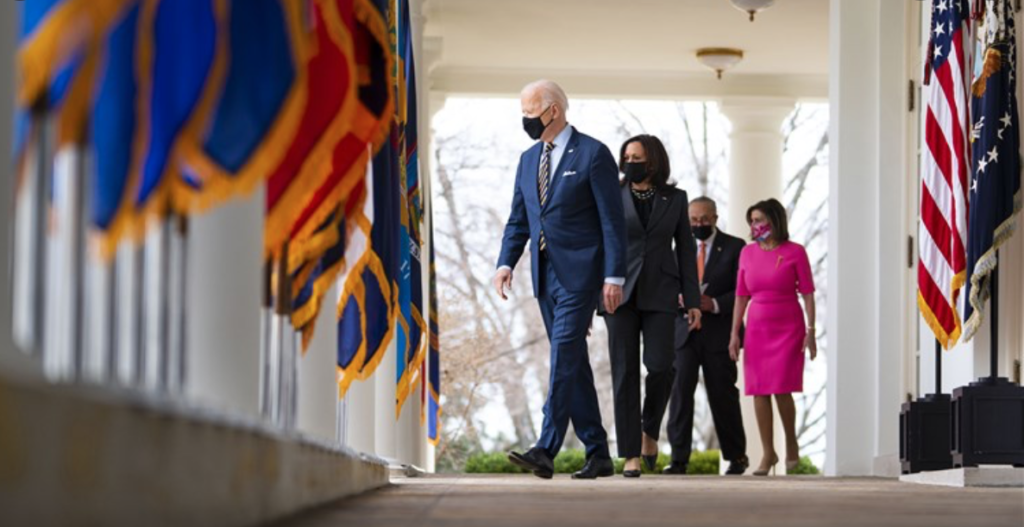Nearing the Finish Line: Biden Concludes Earliest Phase of Presidency By Enhancing COVID-19 Response

Image Courtesy of NBC News
By Justin Lamoureux
With his passing of his hundredth day in office, the transitional phase of Joe Biden’s presidency is nearing its finish. The administration took a number of steps this week to build on their response to the COVID-19 pandemic, and in doing so expanded on the apparent progress already made.
In an effort to assist struggling families during the pandemic, the Biden Administration has announced plans to expand food aid for millions of low-income children. The “Pandemic EBT” program will distribute $375 per child to eligible families; parents can use these funds to purchase groceries during the summer months. This is expected to help resolve a longstanding difficulty for states: Ensuring that all eligible children receive food aid during school breaks. Typically, only 20 percent of recipients can access such aid over the summer.
Congress created the “Pandemic EBT” program to assist millions of children who lost access to free breakfast and lunch when schools shut down last spring. Lawmakers extended the measure through the 2020-2021 school year, and Democrats’ $1.9 trillion economic relief package extended funding through the duration of the outbreak (including the summer). Though Congress has taken steps to expedite the process of approving states to distribute benefits for this program, roughly a dozen states have yet to receive permission. Even within states that have been given approval, many families have not been given benefits.
In addition to targeting families with his relief efforts, President Biden is also working to strengthen emergency safety rules in workplaces across the country. Biden has been pursuing stricter regulations since shortly after he took office. Initially, the president gave the Department of Labor until March 15 to determine whether additional rules were necessary; around that time, however, Labor Secretary Marty Walsh requested an extension of the deadline so that rules could be evaluated more extensively “based on CDC analysis and the latest information regarding the state of vaccinations and the variants.”
Congressional Democrats have asked Labor Department officials and occupational health experts to testify before Congress regarding the progress they have made on amending policy in recent weeks. Concerns have been expressed by Michigan Democratic Representatives Debbie Dingell and Rashida Tlaib, whose state is currently experiencing a surge in COVID-19 cases. It is widely expected that rules will require employers to supply their workers with masks, have a written plan to avert exposure in the workplace, and a number of other precautionary measures. This could incur complaints from businesses, especially as many states have begun to relax COVID-19 restrictions. In the massive stimulus package approved by Congress in March, $75 million was set aside for the Occupational Safety and Health Administration (OSHA); presumably, these funds were intended for use in strengthening workplace safety requirements during the pandemic.
Broadly speaking, the first months of Biden’s presidency have been marked by a number of substantial developments. For starters, 21 of his 23 cabinet nominees – 91% total – have been confirmed by the U.S. Senate. This figure is consistent with the confirmation timeline of former President Trump’s cabinet – 20 of his nominees were confirmed during his first 100 days in office – but is considerably higher than his former boss, Barack Obama. During the first 100 days of Obama’s presidency, only 14 cabinet members were confirmed. It should be noted that Biden’s administration includes a number of unprecedented cabinet picks; for example, Lloyd Austin is the first black person to serve as Defense Secretary, while Janet Yellen is the first woman to lead the Treasury Department. Deb Haaland, Biden’s choice for Secretary of the Interior, is the first Native American to serve in a presidential administration. The demographic makeup of his cabinet indicates a commitment on Biden’s part to promoting diversity in government.
One of the most significant policy accomplishments of Biden’s early presidency comes in the form of the American Rescue Plan. Collaborating with Congressional Democrats, President Biden passed a $1.9 trillion relief package, devoting funds to the assistance of struggling business owners, expediting the vaccination program, and reopening schools. Better known, however, is the economic relief provided to workers and families in the form of $1,400 stimulus checks. The American Rescue Plan has been lauded by Democrats as “historic legislation,” alluding to its unprecedented price tag. It is considerably larger than the $900 billion bipartisan relief package negotiated by Congress in the final days of Trump’s presidency. This package only allocated $600 stimulus checks for struggling families – less than half of what the American Rescue Plan detailed. It is also much larger than the $825 billion recovery plan arranged by the Obama Administration to mediate economic damage following the Great Recession; as vice president, Biden played a crucial role in developing this package.
Perhaps most consequentially, however, the Biden Administration has facilitated the vaccination of over 200 million Americans. As of April 27, 42% of adults nationwide have received at least one dose of the COVID-19 vaccine, with 29% being fully vaccinated. This includes Americans 65 years of age and older, 80% of whom are at least partially vaccinated. The number of vaccines administered is double the initial goal of 100 million, set by President Biden upon taking office in January. While few experts doubted the attainability of Biden’s initial goal, it is unlikely that any would have anticipated the extent to which it would be exceeded.
The Biden presidency began on a highly eventful note. With a strengthened vaccination program, a cabinet confirmed in virtual unanimity, and economic relief facilitated, the administration seems poised to achieve its fundamental goal of addressing the pandemic. The steps taken this week are designed to build on this objective. It remains to be seen whether any of these accomplishments will have a positive impact over the long term, but each one creates the impression of a productive administration.







